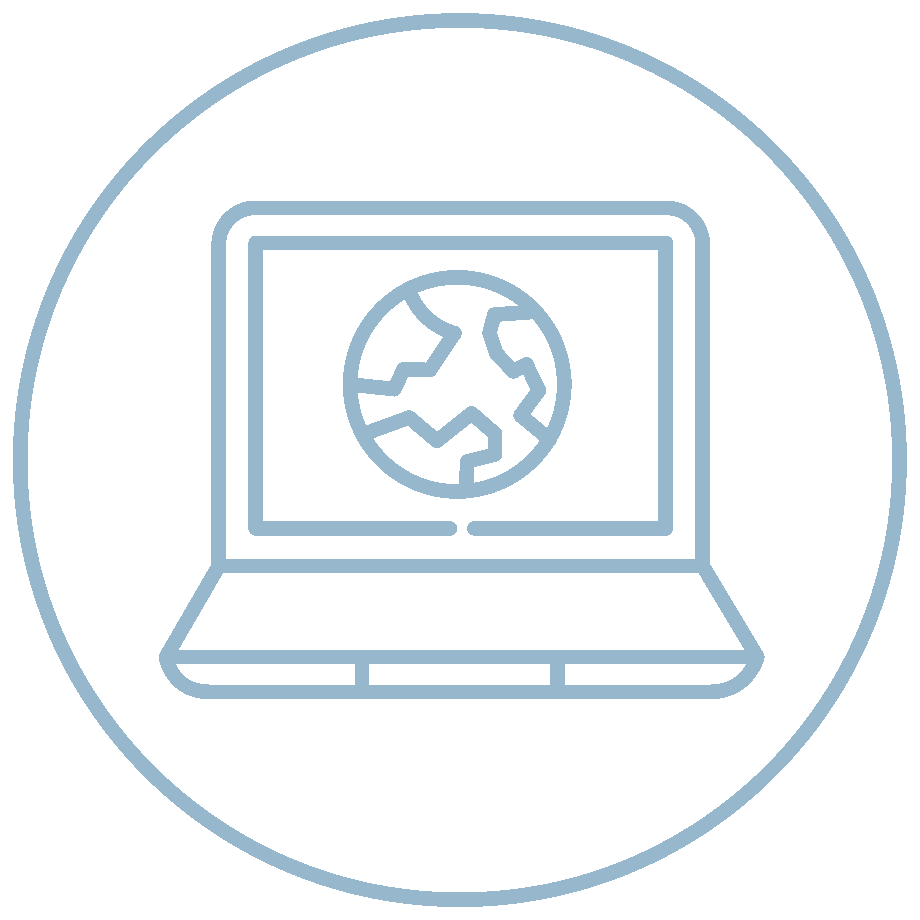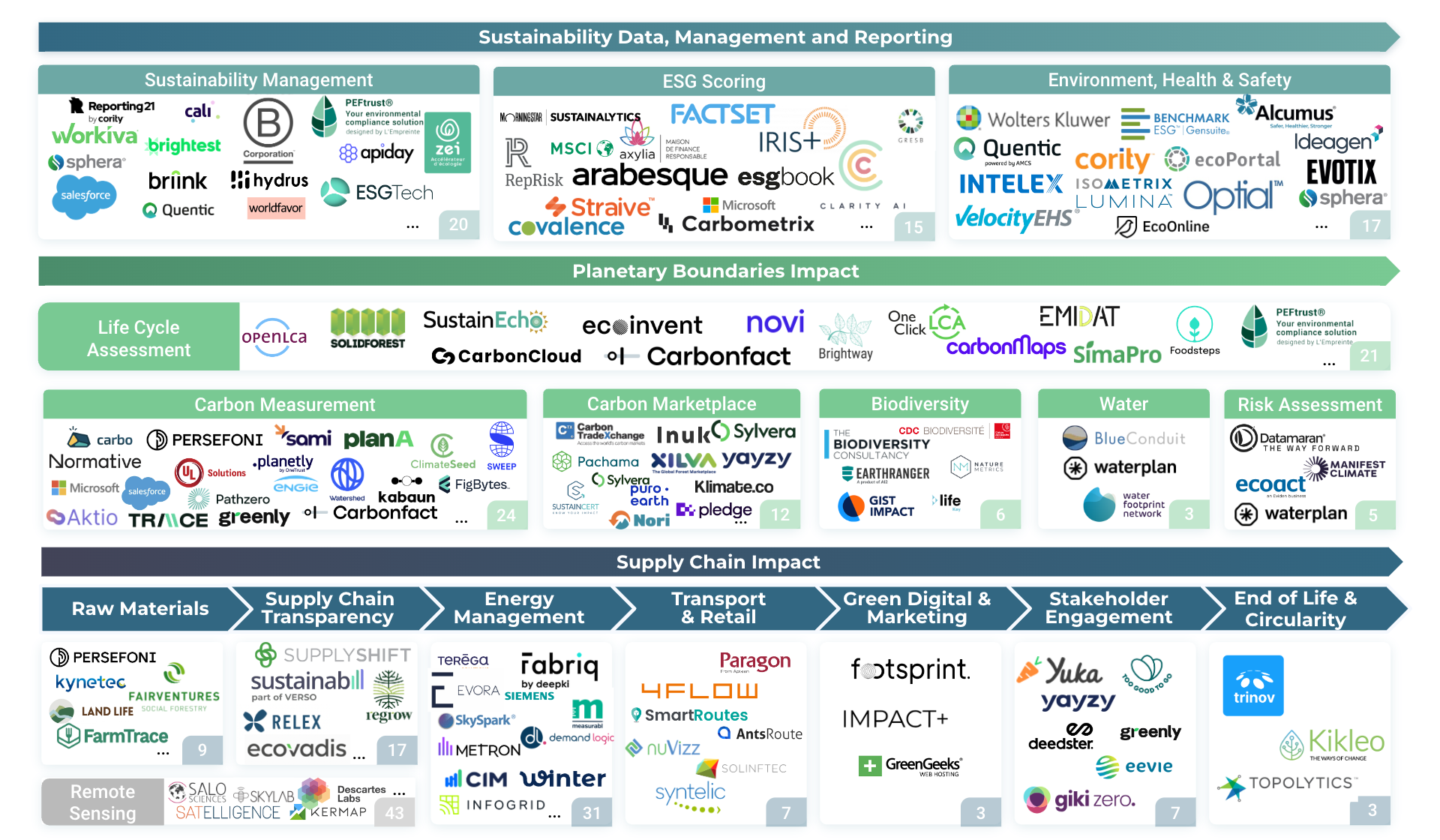TECH RADAR

What are the key technologies that can help you reduce your negative impact?
Which tools are particularly good at which step of your value chain?
Beyond Climate Change, what planetary boundary is a priority for your business?
And, if you are a sustainable tech company, who are your competitors?

The need for a TECH RADAR
In today’s business environment, we are witnessing an increase in innovative technologies to tackle climate change mitigation and adaptation issues. There is a clear acceleration in the adoption of sustainability solutions by industry leaders, enabling the next wave of sustainable transformation. Understanding the available technologies given the current climate landscape allows businesses to define robust sustainability strategies, and to move away from Business-as-usual, accelerating to the next phase of sustainable company growth.
At Impact Labs.earth, we believe that frugality and changes in our way of living and consuming are essential to build Nature Positive Businesses. We also believe that technology can be instrumental in increasing the potential of impact companies and in accelerating the transformation of traditional businesses.
THE AIM OF IMPACT LABS’ TECH RADAR
The Digital4Impact Tech Radar is curated by scanning the horizon to identify emerging technologies and their capabilities across all stages of the sustainability value chain. Our purpose is not to provide an oversimplification of complex systems, but to share our expertise obtained through our business transformation consulting experience. Our in-depth tailored insights empower your decision-making processes with accurate and relevant information. Having high-quality sustainability requirements is the first step to transgress Business-As-Usual, followed by choosing suitable methodologies and technologies that allow at-scale impact.
The Digital4Impact Tech Radar is the map to help you navigate the ever-evolving landscape of digital technologies that are driving sustainability.
Our Methodology
SCOUT
We continually scout the tech landscape for emerging solutions
ANALYZE
We rigorously analyze these technologies, considering their sustainability impact and market viability
DEEP-DIVE
We provide you with detailed tailored RFPs, enabling you to further explore the suggested solutions
Digital4Impact Tech Radar Content:
In the full PDF document you can find an introduction to the Tech Radar, a explanation of our methodology and the following sectorial in-depth analysis:
Carbon Management Deep Dive
The carbon footprint management market is estimated to weigh more than 11 billion dollars in 2023. It is projected to reach 30 billion dollars before the end of the decade.
In the past 3 years, the market has exploded with the launch of many pure players specializing in carbon footprinting and legacy companies coming from sustainability management, launching solutions to help companies assess their carbon footprint.
With the initiation of the CSRD legislation in 2024, many medium and large companies will have to start communicating about their emissions (scopes 1, 2, and 3). In that context, analysing this booming market and curating the relevant technologies for everyone’s needs makes sense.
Remote Sensing Deep Dive
Remote Sensing-based solutions are being adopted by a wide range of industries that depend directly on natural resources, from food to clothing, if we only consider strictly environmental applications. This can be observed by partnerships between remote sensing companies and big players such as Nestlé, Zalando, Nespresso, Channel, Rabobank, and others. These companies have been testing remote sensing capabilities with the objectives of increasing Sourcing Transparency, facilitating environmental data collection for reporting, and supporting green claims.
The combination of spaceborne imagery, AI/Machine Learning, and environmental science has crystallized over the past decade to offer the most promising solution to monitor natural resources at scale and at an unprecedented level of accuracy. Remote Sensing solutions leverage the ever dropping prices of spaceborne data and computing power to serve a wide range of industries: from agrifood, timber, and the voluntary carbon market, to urban planning, all of which heavily rely on land, forest, and crops.
In this Deep Dive, we analyse and detailed the strong suits of 5 representative companies. Find out more by downloading the Digital4Impact Tech Radar below.
SUSTAINABILITY MANAGEMENT DEEP DIVE
In the last 5 years, stakeholders as a whole have become more knowledgeable and more demanding towards Sustainability Management. On the technology front, numerous companies are developing solutions to project manage and report on sustainability data easily and effectively (from $905 million in 2021 to over $4.3 billion in 2027 at a 30% CACR).
Not only are new players emerging but big corporations with decades of knowledge on foundational ESG measures, like Sphera and Enablon, are also developing their own specific tech solutions addressing the entire sustainability implementation process.
To find out more, you can access the Deep dive by downloading the Digital4Impact Tech Radar PDF document below.
CSRD AUTOMATION TECH DEEP DIVE
The Corporate Sustainability Reporting Directive (CSRD) has entered into force making it mandatory for a wide range of companies to extensively report on their sustainability efforts.
Implementing the CSRD presents several major challenges for companies, including the integration of disparate data sources, ensuring data accuracy and consistency, and managing the substantial costs associated with deploying advanced reporting technologies.
Companies must navigate complex regulatory requirements and continuously update their reporting processes to stay compliant, which can be resource-intensive. Additionally, the need for cross-departmental collaboration often highlights existing silos within organizations, complicating the data collection and reporting process. Moreover, there is a continuous demand for training employees and maintaining stakeholder engagement, all while striving to align the CSRD initiatives with the company’s broader strategic objectives and sustainability goals.
BIODIVERSITY MANAGEMENT DEEP DIVE
Digital technologies for biodiversity data collection, MRV, and biodiversity credit exchange are among the fastest-growing nature tech categories, reflecting the increase in awareness of the biodiversity crisis and the increasing demand for biodiversity and nature impact disclosure.
The need to understand and quantify anthropogenic impacts on nature and biodiversity is key in the transition towards nature positivity and essential for a holistic sustainability strategy. However, companies are still struggling to quantify and manage their biodiversity impacts.
To help bring clarity to those looking for biodiversity tools, we researched and analysed solutions that provide:
-
- In-situ data collection
- Automatic data collection through sensors
- Management of impacts, dependencies and risks
Download the full report:


The tech radar for your business interests
The Impact Labs’ Tech Radar goes beyond merely identifying technologies; it helps you align these solutions with your specific company challenges. Impact Labs has deep industry knowledge of the features, capacity, and maturity of technology through the comprehensive analysis and research of the sustainability market.
Impact Labs can provide you with a complete assessment of your company’s actionable areas and conduct Requests for Proposals (RFPs) tailored to your sustainability needs.
























